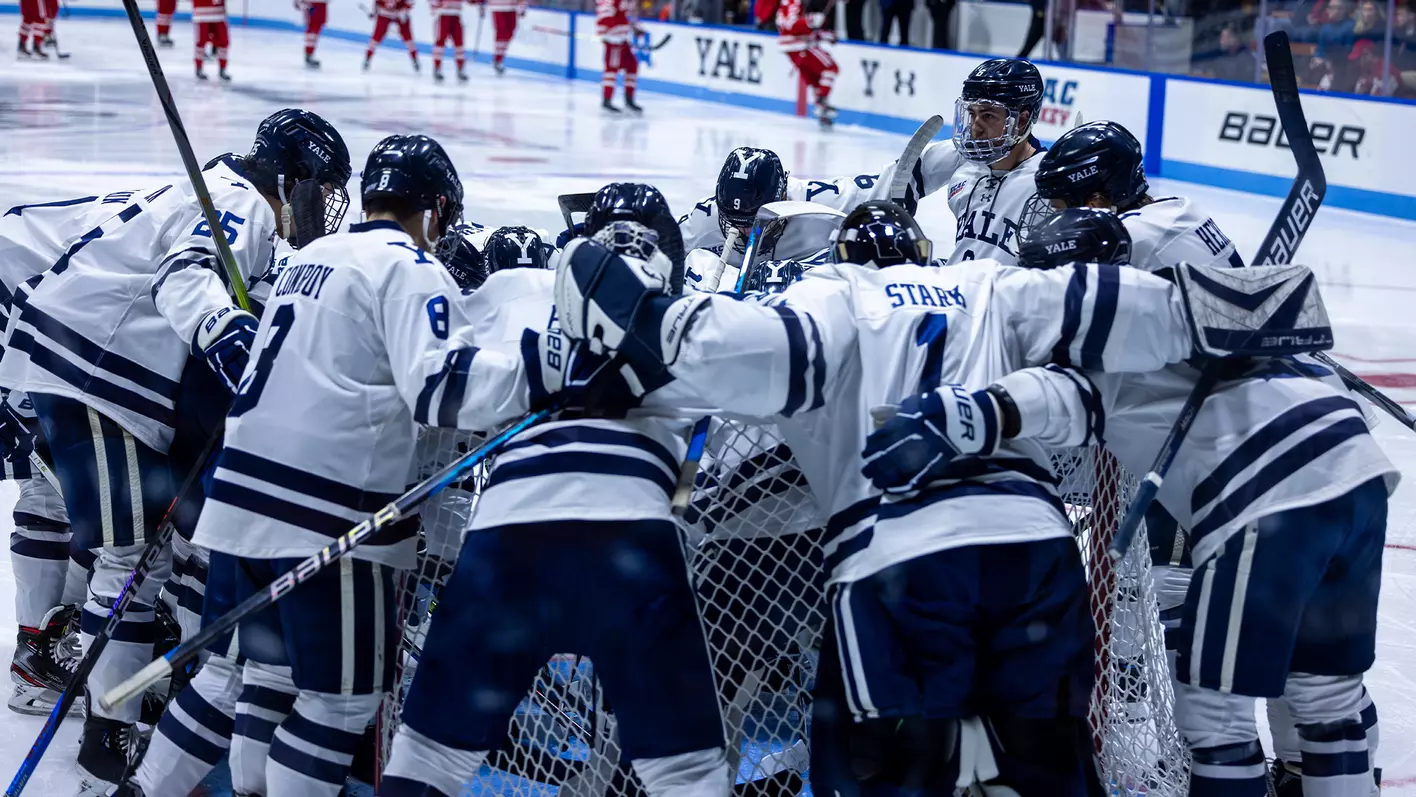Blog
Shocking news: the Yale Men’s hockey teams announced and agree to move on, on the…

Shocking news: the Yale Men’s hockey teams announced and agree to move on, on the…
**Shocking News: The Yale Men’s Hockey Team Announced and Agree to Move On**
In a move that has stunned the world of collegiate sports, the Yale Men’s Hockey team has announced that they are collectively agreeing to “move on” from their current path. This surprising decision marks a significant departure for one of the most storied programs in NCAA Division I hockey. The Yale Bulldogs have long been a force to be reckoned with in collegiate hockey, and this unexpected turn of events has sent shockwaves through the sports community, leaving fans, players, alumni, and experts alike questioning what comes next.

The Announcement: A Shock to Fans and Alumni
The Yale Men’s Hockey team, in a joint statement released by head coach Keith Allain, athletic director Vicky Chun, and members of the team’s leadership, made the announcement that they would be “moving on” from their current trajectory. The statement, which left more questions than answers, expressed the team’s collective decision to move forward into “uncharted territory.” While the wording was vague, the implication was clear: the Yale Men’s Hockey team, for reasons not yet fully disclosed, would be making significant changes to the team’s future operations, structure, and direction.
The news sent ripples across the sports community, especially considering Yale’s place in the pantheon of Ivy League athletics. Historically, the Bulldogs have been one of the premier teams in college hockey, with a tradition of excellence that includes an NCAA National Championship in 2013, multiple ECAC titles, and a reputation for developing top-tier talent. The team’s program has long been a source of pride for the university and its alumni. The announcement, then, was met with shock and confusion, especially since the team had shown promise in recent seasons.
While details of the decision remain murky, the general consensus is that the program is facing a major pivot. For many, the decision to move on is not just a shift in strategy—it represents a profound break from tradition.
### The Yale Men’s Hockey Program: A Legacy of Excellence
Before diving into the reasons behind this surprising shift, it’s important to understand the significant history of the Yale Men’s Hockey program and why this announcement is so impactful.
Yale’s hockey program has long been a leader in collegiate sports. Historically, the Bulldogs have been a strong presence in the Ivy League and the NCAA, with a program that has emphasized both athletic excellence and academic rigor. The 2013 NCAA Championship, which marked the pinnacle of the team’s success, was a moment of immense pride for the university. With a combination of elite-level coaching, skilled players, and a rich culture of hard work and determination, Yale’s men’s hockey team has been a benchmark for success in college hockey.
Yale has produced numerous NHL players, and the team’s alumni include both well-known professional players and successful coaches. The team’s home rink, Ingalls Rink, affectionately known as “The Whale,” has become one of the most iconic venues in college hockey. With its steep seating and intimate atmosphere, it’s a place where Yale fans have cheered on their team through countless thrilling moments. For years, the Bulldogs’ performance on the ice was synonymous with winning and competitiveness, establishing them as one of the top hockey programs in the country.
However, despite its success, the past few seasons have been challenging. While the Bulldogs have remained competitive within the ECAC and NCAA, they have struggled to replicate the dominant form they exhibited in their championship year. The increasing demands of recruiting, financial support, and maintaining a balance between academics and athletics may have begun to take their toll on the program, and some believe that this announcement is a reflection of those struggles.
### The Reasons Behind the Decision to Move On
The exact reasons behind Yale’s decision to move on remain largely undisclosed, but several potential factors can be identified. These could include internal conflicts, external pressures, or a shift in strategic direction for the university’s athletics.
#### 1. **Financial Constraints and Changing Athletic Landscape**
One possible reason behind the move is the financial realities facing many NCAA programs today. College athletics, especially in non-revenue sports like hockey, have increasingly come under financial scrutiny. While hockey remains a popular sport at Yale, the costs associated with running a high-level program—especially one in the Ivy League—are significant. From recruiting costs to maintaining facilities, travel expenses, and staffing, the financial burden is not insignificant.
Furthermore, the COVID-19 pandemic has placed additional strain on athletic programs, especially those that rely on ticket sales, donations, and fundraising to maintain their programs. The pandemic also led to changes in the way schools approach athletic programming, with some institutions cutting sports or rethinking the way they allocate resources. Yale may have found that the current model for its men’s hockey program was unsustainable or no longer aligned with the university’s broader athletic and financial priorities.
#### 2. **Internal Disagreements and Coaching Changes**
Another factor could be internal tensions within the program. Head coach Keith Allain, who has been with the Bulldogs since 2006, is widely regarded as one of the top college hockey coaches in the country. However, any program—no matter how successful—can face internal challenges, especially over an extended period. It’s possible that disagreements over the team’s direction, coaching philosophy, or the administration of the program contributed to the decision to make a change.
There have been reports of differing opinions on how to balance recruiting and academics in the Ivy League system, which places particular emphasis on student-athletes’ academic commitments. The pressure of managing such a unique environment may have become untenable for some within the program. If internal disagreements or a sense of stagnation had taken root, the decision to move on may have been viewed as the only viable path forward.
#### 3. **Shifting Priorities and Focus on Academic Excellence**
Yale, as one of the most prestigious Ivy League schools, has always been committed to maintaining a balance between academic excellence and athletic performance. While athletic success is certainly important, the university’s primary focus has always been its academic reputation. As the landscape of collegiate athletics continues to evolve—especially with the increasing commercialization and professionalization of sports—Yale may have reevaluated its priorities.
In recent years, there has been growing pressure on universities to either fully commit to athletics or reduce their athletic offerings. Yale’s decision to “move on” could reflect a shift in focus, choosing to double down on academic integrity rather than continuing to pour resources into a competitive yet financially challenging athletic program.
#### 4. **Evolving Landscape of College Hockey**
The college hockey landscape is changing, and with it, Yale’s place in the pecking order. The NCAA has undergone a series of changes in how programs operate, including the establishment of new conferences, new rules governing recruiting, and an overall shift in how college hockey is structured. The increased attention on major hockey programs like those in the Big Ten and Hockey East has created new competitive dynamics, and Ivy League schools like Yale may feel the pressures of trying to compete at the highest level in a sport that is increasingly dominated by large, well-funded programs.
Additionally, as professional leagues like the NHL and various minor leagues become more involved with college hockey, the talent pool has become more competitive. Yale, despite its storied history, may have found itself struggling to keep up with the changing demands of recruitment and program development.
### What’s Next for Yale Men’s Hockey?
While the announcement that Yale’s men’s hockey team is moving on is startling, it is important to recognize that this may not be the end of the program. Rather, it could signal a reimagining of how the team operates and what its future might look like. Whether this involves a significant restructuring of the program, a shift in focus to developing student-athletes in a new way, or the potential creation of new opportunities for the team to evolve, it remains to be seen.
The reaction from the broader college hockey community will be one of both surprise and curiosity. Yale’s move could spark conversations around the future of college hockey at Ivy League schools and potentially inspire other universities to reconsider how they approach their athletic programs.
For Yale’s loyal fanbase, alumni, and players, the future of Yale Men’s Hockey will remain uncertain for now. However, as with all great programs, Yale’s legacy in hockey has been built on resilience, innovation, and a commitment to excellence. The Bulldogs will undoubtedly find a way to adapt, whether through a redefined model of success or by embracing new forms of competition. Only time will tell how Yale’s hockey program evolves, but one thing is clear: the announcement to “move on” is a chapter that has the potential to reshape the future of college hockey.
-

 AS Roma6 months ago
AS Roma6 months agoAffare fatto: la Roma acquista Federico Chiesa con una trattativa colossale.
-

 AS Roma8 months ago
AS Roma8 months agoRoma acquista Kalvin Phillips Il centrocampista del Manchester City
-

 Bayer04 Leverkusen9 months ago
Bayer04 Leverkusen9 months agoXabi Alonso sendet starke Botschaft an Bayer Leverkusen Fans
-

 Sevilla FC6 months ago
Sevilla FC6 months agoÚltimas noticias: La dirección del Sevilla transfiere el 75% de las acciones del club al multimillonario saudí para solucionar los problemas financieros.
-

 Real Betis7 months ago
Real Betis7 months agoEl Real Betis adquiere al mejor defensor de Valencia Cristhian Mosquera para fortalecer su defensa.
-

 AS Roma12 months ago
AS Roma12 months agoUltime notizie: la Roma in grossi guai mentre la UEFA ha risposto a Dybala che prendeva in giro Feyernood.
-

 Bayer04 Leverkusen11 months ago
Bayer04 Leverkusen11 months agoEilmeldung: „Xabi Alonso spricht im Medieninterview über seine Zukunft bei Bayer Leverkusen“
-

 AS Roma11 months ago
AS Roma11 months agoUltime notizie: la Roma è nei guai: João Pedro ha inviato un messaggio forte dopo il pareggio degli ottavi di finale di Europa.


